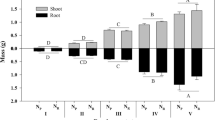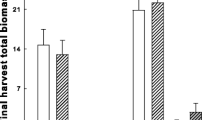Abstract
Background and aims
Predators may partially or completely consume Quercus spp. acorns, but effects on nutrient remobilization and seedling performance are poorly understood. We investigated interactions between soil fertility and the removal of Quercus variabilis acorn cotyledons at different early developmental stages on seedling nutrition and development.
Methods
Seedlings were grown in two soils of contrasting fertility and the kinetics of acorn nitrogen, phosphorus and potassium remobilization, and seedling survival, growth and nutrient content were analyzed.
Results
Acorn mass and macronutrients decreased remarkably <2 weeks after emergence, with nitrogen and phosphorus remobilizing faster than potassium. Acorn removal at or 1 week after emergence inhibited seedling survival, growth and fine root formation, whereas removal from 2 to 10 weeks after emergence had minor effects. Acorn macronutrient remobilization and effects of acorn removal on seedling performance were not reversed under high soil fertility. When acorns were removed ≥2 weeks after emergence, fertilization increased root surface and seedling nitrogen content.
Conclusions
Acorn nutrients are more important than soil nutrients during very early seedling development. Cotyledon damage at emergence impairs seedling performance despite no direct damage to the remainder of the seedling. This effect cannot be reverted by high soil fertility and has potential ecological and practical implications for oak regeneration.






Similar content being viewed by others
References
Andersson C, Frost I (1996) Growth of Quercus robur seedlings after experimental grazing and cotyledon removal. Acta Bot Neerlandica 45:85–94
Bonfil C (1998) The effects of seed size, cotyledon reserves, and herbivory on seedling survival and growth in Quercus rugosa and Q. Laurina (Fagaceae). Am J Bot 85:79–87. https://doi.org/10.2307/2446557
Bossema I (1979) Jays and oaks: an eco-ethological study of a symbiosis. Behaviour 70:1–117
Branco M, Branco C, Merouani H, Almeida MH (2002) Germination success, survival and seedling vigour of Quercus suber acorns in relation to insect damage. For Ecol Manag 166:159–164
Chang G, Zhang Z (2014) Functional traits determine formation of mutualism and predation interactions in seed-rodent dispersal system of a subtropical forest. Acta Oecol 55:43–50. https://doi.org/10.1016/j.actao.2013.11.004
Coomes DA, Grubb PJ (2003) Colonization, tolerance, competition and seed-size variation within functional groups. Trends Ecol Evol 18:283–291
Davis AS, Jacobs DF (2005) Quantifying root system quality of nursery seedlings and relationship to outplanting performance. New For 30:295–311. https://doi.org/10.1007/s11056-005-7480-y
Esteso-Martinez J, Camarero JJ, Gil-Pelegrin E (2006) Competitive effects of herbs on Quercus faginea seedlings inferred from vulnerability curves and spatial-pattern analyses in a Mediterranean stand (Iberian system, northeast Spain). Ecoscience 13:378–387. https://doi.org/10.2980/i1195-6860-13-3-378.1
García-Cebrián F, Esteso-Martínez J, Gil-Pelegrín E (2003) Influence of cotyledon removal on early seedling growth in Quercus robur L. Ann For Sci 60:69–73. https://doi.org/10.1051/forest
Gómez JM (2003) Spatial patterns in long-distance dispersal of Quercus ilex acorns by jays in a heterogeneous landscape. Ecography (Cop) 26:573–584. https://doi.org/10.1034/j.1600-0587.2003.03586.x
Grossnickle SC (2012) Why seedlings survive: influence of plant attributes. New For 43:711–738. https://doi.org/10.1007/s11056-012-9336-6
Hanley ME, Fegan EL (2007) Timing of cotyledon damage affects growth and flowering in mature plants. Plant Cell Environ 30:812–819. https://doi.org/10.1111/j.1365-3040.2007.01671.x
Harmer R (1990) Relation of shoot growth phases in seedling oak to development of the tap root, lateral roots and fine root tips. New Phytol 115:23–27. https://doi.org/10.1111/j.1469-8137.1990.tb00917.x
Harper JL, Lovell PH, Moore KG (1970) The shapes and sizes of seeds. Annu Rev Ecol Syst 1:327–356. https://doi.org/10.1146/annurev.es.01.110170.001551
Jacobs DF, Salifu KF, Seifert JR (2005) Growth and nutritional response of hardwood seedlings to controlled-release fertilization at outplanting. For Ecol Manag 214:28–39. https://doi.org/10.1016/j.foreco.2005.03.053
Jha A, Kamalvanshi M, Kumar A et al (2014) The effects of arbuscular mycorrhizal inoculations and cotyledon removal on early seedling growth of Pongamia pinnata. Turk J Bot 38:526–535. https://doi.org/10.3906/bot-1309-4
Johnson PS, Shifley SR, Rogers R (2009) The ecology and silviculture of oaks, 2nd edn. MPG Books Group, Bodmin
Kabeya D, Sakai S (2003) The role of roots and cotyledons as storage organs in early stages of establishment in Quercus crispula: a quantitative analysis of the nonstructural carbohydrate in cotyledons and roots. Ann Bot 92:537–545. https://doi.org/10.1093/aob/mcg165
Kitajima K (2003) Impact of cotyledon and leaf removal on seedling survival in three tree species with contrasting cotyledon functions. Biotropica 35:429–434. https://doi.org/10.1111/j.1744-7429.2003.tb00597.x
Kormanik PP, Sung SS, Kormanik TL et al (1998) Effect of acorn size on development of northern red oak 1-0 seedlings. Can J For Res 28:1805–1813. https://doi.org/10.1139/cjfr-28-12-1805
Landis TD (1989) Mineral nutrients and fertilization. In: Landis TD, Tinus RW, McDonald SE, Barnett JP (eds) The container tree nursery manual, volume 4. Seedling nutrient and irrigation. Agriculture handbook. Department of Agriculture, Forest Service, Washington, D.C., pp 23–25
Li G, Zhu Y, Liu Y et al (2014) Combined effects of pre-hardening and fall fertilization on nitrogen translocation and storage in Quercus variabilis seedlings. Eur J For Res 133:983–992. https://doi.org/10.1007/s10342-014-0816-4
Marschner P (2012) Marschner’s mineral nutrition of higher plants, 3rd edn. Academic Press, Beijing
Merouani H, Branco C, Almeida MH, Pereira JS (2001) Effects of acorn storage duration and parental tree on emergence and physiological status of cork oak (Quercus suber L.) seedlings. Ann For Sci 58:543–554. https://doi.org/10.1051/forest:2001144
Milberg P, Lamont BB (1997) Seed/cotyledon size and nutrient content play a major role in early performance of species on nutrient-poor soils. New Phytol 137:665–672. https://doi.org/10.1046/j.1469-8137.1997.00870.x
Moro MJ, Pugnaire FI, Haase P, Puigdefábregas J (1997) Mechanisms of interaction between a leguminous shrub and its understorey in a semi-arid environment. Ecography (Cop) 20:175–184
Muñoz A, Bonal R (2007) Rodents change acorn dispersal behaviour in response to ungulate presence. Oikos 116:1631–1638. https://doi.org/10.1111/j.2007.0030-1299.15710.x
Muñoz A, Bonal R, Díaz M (2009) Ungulates, rodents, shrubs: interactions in a diverse Mediterranean ecosystem. Basic Appl Ecol 10:151–160. https://doi.org/10.1016/j.baae.2008.01.003
Newton AC, Pigott CD (1991) Mineral nutrition and mycorrhizal infection of seedling oak and birch I. Nutrient uptake and the development of mycorrhizal infection during seedling establishment. New Phytol 117:37–44. https://doi.org/10.1111/j.1469-8137.1991.tb00942.x
Oliet JA, Tejada M, Salifu KF et al (2009) Performance and nutrient dynamics of holm oak (Quercus ilex L.) seedlings in relation to nursery nutrient loading and post-transplant fertility. Eur J For Res 128:253–263. https://doi.org/10.1007/s10342-009-0261-y
Oliet JA, Puértolas J, Planelles R, Jacobs DF (2013) Nutrient loading of forest tree seedlings to promote stress resistance and field performance: a Mediterranean perspective. New For 44:649–669. https://doi.org/10.1007/s11056-013-9382-8
Oyama T, Ito M, Kobayashi K et al (1991) Analytical procedures of N, P, K contents in plant and manure materials using H2SO4-H2O2 Kjeldahl digestion method. Bull Fac Agric Niigata Univ 43:111–120 (In Japanese with English summary)
Perea R, Miguel AS, Gil L (2011) Acorn dispersal by rodents: the importance of re-dispersal and distance to shelter. Basic Appl Ecol 12:432–439. https://doi.org/10.1016/j.baae.2011.05.002
Pulido FJ, Díaz M (2005) Regeneration of a Mediterranean oak: a whole-cycle approach. Écoscience 12:92–102. https://doi.org/10.2980/i1195-6860-12-1-92.1
Schupp EW, Jordano P, Gómez JM (2010) Seed dispersal effectiveness a conceptual review. New Phytol 188:333–353. https://doi.org/10.1111/j.1469-8137.2010.03402.x
Shi W, Bloomberg M, Li G et al (2017) Combined effects of cotyledon excision and nursery fertilization on root growth, nutrient status and outplanting performance of Quercus variabilis container seedlings. PLoS One 12:e0177002. https://doi.org/10.1371/journal.pone.0177002
Smith CC, Fretwell SD (1974) The optimal balance between size and number of offspring. Am Nat 108:499–506. https://doi.org/10.1086/282929
Sone K, Hiroi S, Nagahama D et al (2002) Hoarding of acorns by granivorous mice and its role in the population processes of Pasania edulis (Makino) Makino. Ecol Res 17:553–564. https://doi.org/10.1046/j.1440-1703.2002.00514.x
Sonesson LK (1994) Growth and survival after cotyledon removal in Quercus robur seedlings, grown in different natural soil types. Oikos 69:65–70
Suszka B (2006) Generative propagation. In: Bugala W (ed) Dęby (Quercus robur L.; Q. petraea (Matt.) Liebl.) —Nasze drzewa leśne. Bogucki Wydawnictwo Naukowe, Poznań, pp 305–388
Taiz L, Zeiger E (2010) Assimilation of mineral nutrients. In: Taiz L, Zeiger E (eds) Plant physiology, 4th edn. Sinauer Associates, Sunderland, pp 259–282
Verdú M, García-Fayos P (2003) Frugivorous birds mediate sex-biased facilitation in a dioecious nurse plant. J Veg Sci 14:35–42
Villar-Salvador P, Heredia N, Millard P (2010) Remobilization of acorn nitrogen for seedling growth in holm oak (Quercus ilex), cultivated with contrasting nutrient availability. Tree Physiol 30:257–263. https://doi.org/10.1093/treephys/tpp115
Villar-Salvador P, Puértolas J, Cuesta B et al (2012) Increase in size and nitrogen concentration enhances seedling survival in Mediterranean plantations. Insights from an ecophysiological conceptual model of plant survival. New For 43:755–770. https://doi.org/10.1007/s11056-012-9328-6
Villar-Salvador P, Peñuelas JL, Nicolás-Peragón JL et al (2013) Is nitrogen fertilization in the nursery a suitable tool for enhancing the performance of Mediterranean oak plantations? New For 44:733–751. https://doi.org/10.1007/s11056-013-9374-8
Yang Z, Ma L, Jia Z et al (2012) Annual growth dynamics of one-year-old Quercus variabilis seedlings. J Northeast For Univ 40:9–12 (In Chinese with English summary)
Yi X, Liu C (2014) Retention of cotyledons is crucial for resprouting of clipped oak seedlings. Sci Rep 4:5145. https://doi.org/10.1038/srep05145
Yi X, Yang Y, Curtis R et al (2012) Alternative strategies of seed predator escape by early-germinating oaks in Asia and North America. Ecol Evol 2:487–492. https://doi.org/10.1002/ece3.209
Zhang W, Lu Z, Li J, Liu G (2002) A comparative study on spatial distribution pattern and its dynamics of Quercus variabilis populations among different forest areas in shanxi province, China. Acta Botan Boreali-Occiden Sin 22:476–483 (In Chinese with English summary)
Zhang Z, Wang Z, Chang G et al (2016) Trade-off between seed defensive traits and impacts on interaction patterns between seeds and rodents in forest ecosystems. Plant Ecol 217:253–265. https://doi.org/10.1007/s11258-016-0566-0
Acknowledgements
This work was funded by the National Natural Science Foundation of China (31670638); Fundamental Research Funds for the Central Universities (TD2011-8), Special Funds for Beijing Municipal Common Construction Project with Central Universities. We acknowledged the project CGL 2014-53308-P SERAVI and by the network REMEDINAL 3 (S2013/MAE-2719) of the CAM. We thank the executive editor and anonymous reviewers for their insightful comments. Our special thanks go to the managers and workers of Jiufeng Mountain greenhouse for their valuable help and support.
Author information
Authors and Affiliations
Corresponding author
Ethics declarations
Conflict of interest
The authors declare that they have no conflict of interest.
Additional information
Responsible Editor: Jeffrey Walck
Electronic supplementary material
ESM 1
(DOCX 78 kb)
Rights and permissions
About this article
Cite this article
Shi, W., Villar-Salvador, P., Jacobs, D.F. et al. Simulated predation of Quercus variabilis acorns impairs nutrient remobilization and seedling performance irrespective of soil fertility. Plant Soil 423, 295–306 (2018). https://doi.org/10.1007/s11104-017-3518-0
Received:
Accepted:
Published:
Issue Date:
DOI: https://doi.org/10.1007/s11104-017-3518-0




